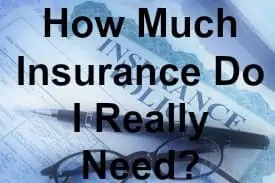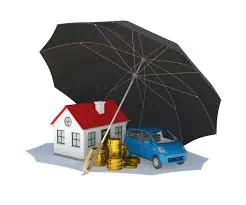Follow this guide on how much insurance you need and the types that could save you from catastrophic financial ruin
I know talking about insurance isn’t everyone’s idea of fun but before you zone out or click through this post, let me relate a story that changed my view on insurance, one that I think will change yours as well.
Like most people, I’ve gambled with insurance policies in the past. You probably recognize the old me.
You let an insurance policy lapse and think, “I’ve been paying into this scam for years and never needed it. I’ll get another policy but let’s give it a few months and save a few hundred dollars.”
Then something happened to my boss and I’ve never let a policy lapse since. You see, my boss was trying to sell his house after having moved out. It had sat on the market for a month but was only priced around market value so he didn’t think it would be long before it sold. His let his homeowner’s policy lapse.
A fire ripped through house and it cost nearly $47,000 to rehab… and he still had to worry about getting it sold.
It’s not just homeowner’s insurance that can save your financial life. Nearly half of all personal bankruptcies involve unpaid emergency medical bills.
You definitely need insurance…but how much? What types of insurance do you need and are there ways to save on premiums?
This article, the fifth post in our 5-week personal finance fix, will help you not make the same mistake as my boss. We’ll cover what types of insurance and how much insurance you need. You don’t need a Mercedes-class policy for most types of insurance but neglecting the subject altogether could have you taking the bus for the rest of your life.

Week One: Setting financial goals and how to make a budget you can keep
Week Two: Investing Basics and Beyond
Week Three: Getting to Sandy Beaches: Realistic Retirement Planning
Week Four: 16 Easy Money Tax Tips
Why Do You Really Need Insurance?
Understanding what insurance is for will help you understand why you shouldn’t gamble with policies and who much you need.
Insurance is meant to cover catastrophic loss, the kinds of financial events that would force you into bankruptcy almost immediately. We’re talking about potential problems that could cost tens of thousands or more.
That means you don’t need insurance to cover the little things, those little expenses filed under ‘life happens’ that might cost a couple hundred dollars. For these smaller expenses, you should have an emergency fund that can cover a few thousand dollars either to pay the cost entirely or to pay the deductible on your insurance.
You don’t want to be constantly paying premiums for these little expenses but you absolutely need to keep up your insurance for the big problems that could ruin you.

That should help give you an idea of the kinds of insurance you need.
- Protecting your home from fire and total loss, yes.
- An extended warranty on that $50 microwave, no.
- Health insurance against catastrophic medical bills, yes.
- Trip insurance to cover a $300 flight, no.
Understanding that insurance is about covering those catastrophic losses will also help you decide how much insurance to buy and how to set your deductibles.
Buying a premium with a higher deductible, into the thousands of dollars, will mean less expensive premiums each month. It will also mean you won’t file as many claims which could put you in a higher risk category (more on this in the next section).
How Does Insurance Work?
It’s also helpful to know how insurance works, how companies determine the premiums you pay.
When you buy an insurance policy, the representative will ask relevant questions to the insurance topic.
- For health insurance, you’re asked questions about your medical history and actions that affect your health like smoking and exercise.
- For home insurance, you’re asked questions about the value of your home and things that might lower risk like home security alarms or fire detectors.
Your answers to these questions put you in a group with all the people that answered roughly the same way. The people in each group all share common characteristics, demographics and lifestyles.
By studying each group, the insurance company can get an idea about how often the average person will file a claim and for how much. They can use this information to figure out how much to charge each person in the group to cover insurance claims plus a little left over for profit.
Some of the factors that put you in a certain group for insurance will be impossible to change, for example your age and medical history. Other factors can be changed so it’s important to ask your insurance agent what you can do to lower your premiums.
Now on to the specific types of insurance.
Health Insurance Can Save Your Life
Healthcare is changing, it seems every year. The only thing that doesn’t change is that healthcare is expensive and everyone needs it.
Whether you are young or old, healthy or otherwise, you will face high healthcare expenses at some point in your life.
The average household spends more than $4,300 on healthcare each year and that number jumps to over $5,700 for people 65 and older. That may not seem like much until you consider much of the expense is covered by health insurance.
Without health insurance, you could be looking at medical bills well into the tens of thousands in any given year.
The two types of health insurance are indemnity and managed care. Indemnity plans or fee-for-service will generally give you more flexibility for where you go but will cost more out of pocket. You’ll have to pay an annual deductible before your insurance kicks in and be responsible for a co-payment afterwards.
Make sure you ask how the policy determines the amount insurance will pay. Many policies will pay a percentage of the ‘usual and customary’ fee for the particular medical service in your area, even if that fee is much less than was actually charged by the doctor. You will be responsible for the rest.
Managed care plans use health maintenance organization networks (HMO) to lower fees. It may be cheaper than an indemnity plan but you will be confined to a network of doctors and hospitals, or face much higher bills. Managed care plans sometimes offer point-of-service plans (POS) so you can go outside the network without paying too much more.
Choosing a high deductible will save you on premiums and give you the opportunity to lower your tax bill in one of my favorite savings plans. To be eligible to contribute to a Health Savings Account (HSA), you need a high-deductible policy which usually means at least $1,300 for individuals or $2,600 for families.
You can contribute to the HSA with before-tax dollars, meaning you don’t pay income or payroll taxes on this amount. That’s like getting a 20% or more discount on your medical expenses!
Some other helpful points when thinking about health insurance:
- Group coverage from your employer is usually going to be the best bet. Your employer did the hard part and negotiated a better rate, grab it.
- The lowest premium isn’t necessarily the best. Make sure you check out what the policy covers and how much you pay upfront.
- Make sure you check out the coverage network included in your policy. How much extra will you have to pay to go outside of the network.
Cover Your House Like There’s No Place Like Home
The U.S. Fire Administration, a department of FEMA, reported just under 400,000 residential fires in 2014. That’s about one fire for every 320 houses.
Your odds of a fire completely destroying your home are fairly long…but think of the costs if it does.
Besides fire, home insurance covers the cost to rebuild or replace after a range of other accidents that can all wreak havoc and leave you homeless.
Your homeowner’s policy will cover the cost to repair after an accident plus some of the cost to replace personal items inside the house. Most policies cover between 50% to 75% of the value for personal property but be sure to check your policy.
If you live in an older home, you might want to consider a guaranteed replacement cost provision to cover costs even if construction prices increase over time. You’ll also want a rider, an addition to your policy, that will cover building code upgrades if you have to rebuild.

A few tips when buying insurance for your home.
- Skip the additional riders for jewelry and other personal property. These will increase your premium and can be covered by your emergency money.
- Renter’s insurance should only cover what you need to replace to get back on your feet.
- Flood insurance is separate and not covered by a general homeowner’s policy. Make sure to check if your home is in a flood zone and protect yourself.
You Need More Car Insurance than What’s Required
There are five types of coverage for your car: liability, collision, comprehensive, personal injury and uninsured motorist.
Most states have a minimum coverage requirement for liability insurance which pays in the event of an accident that was your fault. Select the highest deductible you can afford, up to $1,000 or more, to keep your premiums lower and keep from filing a claim for every fender-bender.
Depending on the value of your car, collision coverage may not be worth it given premiums and the deductible. Shop around to see how much monthly premiums would be and how much your car would be worth to replace.
Comprehensive coverage will pay if something happens to your car unrelated to an accident like weather damage, hitting an animal or theft. It can be expensive but is definitely worth it if you still have payments or your car would be expensive to replace.
Personal injury coverage will help pay medical bills in the event of an accident. Liability and collision coverage may only pay for repairs to the car.
Uninsured motorist coverage isn’t usually very expensive and is another one of those things that is really great to have if you need it.
Some final car insurance tips to consider.
- There are usually special discounts if you have an alarm, air bags or anti-lock brakes. Shop around for car insurance and ask agents about any discount programs.
- Work on your credit score! Insurance companies charge bad credit drivers up to 90% more on average for premiums based on credit-based insurance scoring.
Not Everyone Needs Life Insurance
This is controversial advice, especially for the life insurance agents out there, but the truth is that not everyone needs life insurance.
The reason for life insurance is to replace your income for family members if you were to die. That begs the question, “If nobody depends on your income besides you, do you really need to replace it if you die?”
The answer is, of course, no.
If you do have people relying on your income then you absolutely need life insurance. Even dual-income families would have trouble paying the bills if one of those incomes were to suddenly stop.
How much life insurance you need depends on your income, how dependent others are on it and how many years you have left to work. The older you get, the less life insurance you will need. You don’t need a million-dollar policy if you only have a few years left to work.
There are two ways to figure the amount of life insurance you need.
- Enough to cover your after-tax income for the number of years left to retirement. Some agents advise that up to 10 years’ income is enough.
- Enough to pay off major expenses like the mortgage and college tuition costs.
- Use a life insurance comparison tool to find a policy that meets your needs.
You don’t need life insurance for your entire life. Policies that extend into your 60s and 70s can be extremely expensive and are likely not necessary. After looking at your investments and debts, you may decide that you only need life insurance to cover you for as long as you’re paying off your mortgage or until about 60 years old.
There are principally two types of life insurance, term and whole life. Term insurance is the purest form while whole life policies carry an investment component.
Whole life policies can take different forms like universal or variable life though they are all basically just different combinations of a term policy with an investment component. Every month, part of your premium goes to the life insurance policy and another part goes towards building the investment value.
Life insurance is a money-maker for agents and the majority of your first year’s premium will probably go to paying the agent’s commission. Agents make even more money selling whole life policies so be wary of sales pitches leading you away from less expensive term life. The buildup of cash value isn’t usually enough to compensate for higher whole life premiums and you’ll pay huge penalties for cancelling the policy.
When buying a life policy, make sure you know if your premiums are guaranteed or reviewable. Reviewable premiums may be cheaper at first but may also change in the future. It’s usually better to lock-in a premium with guaranteed terms if you are young and relatively healthy.
Some helpful things to remember when choosing a life policy:
- Whole life policies carry an investment component but can be several times more expensive than term life insurance. Consider the cheaper term policy that covers your needs and then invest the difference on your own.
- Buy an umbrella when it’s sunny! Buy your life insurance policy when you’re young and healthy, when the premiums will be much cheaper.
- Joint policies only pay out when the first partner passes and then the policy terminates. This could leave the surviving spouse to look for a new policy to cover surviving children if something should happen later in life. Individual policies may not be that much more expensive than joint.
- You can lock in premiums for 5, 10, 15 and even 20 years. Longer-term premiums will start higher but won’t adjust upwards as frequently. Look for a policy with guaranteed renewability so it can’t be canceled for poor health.
Buying insurance isn’t on most people’s short-list for fun but it’s something that comes with being an adult. Remember that insurance is for covering catastrophic losses that would wipe you out financially and use that to help determine the types of insurance and how much you need.
